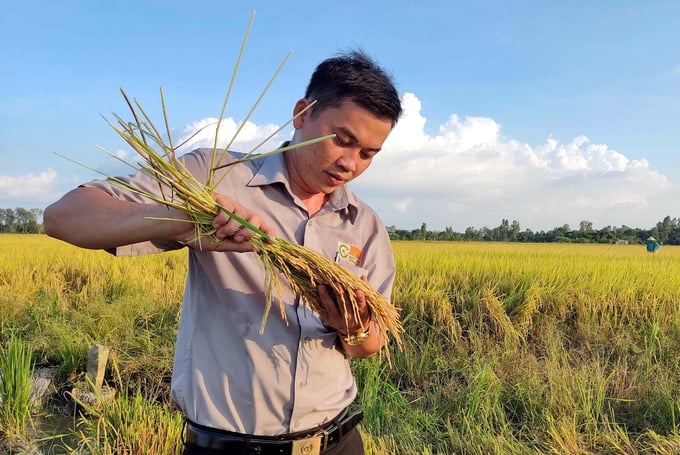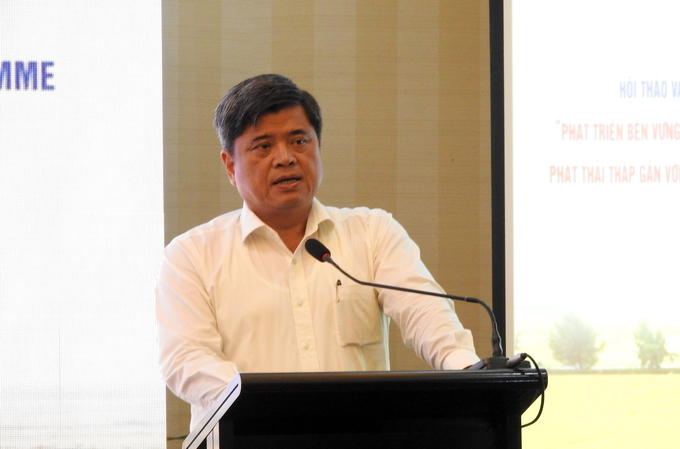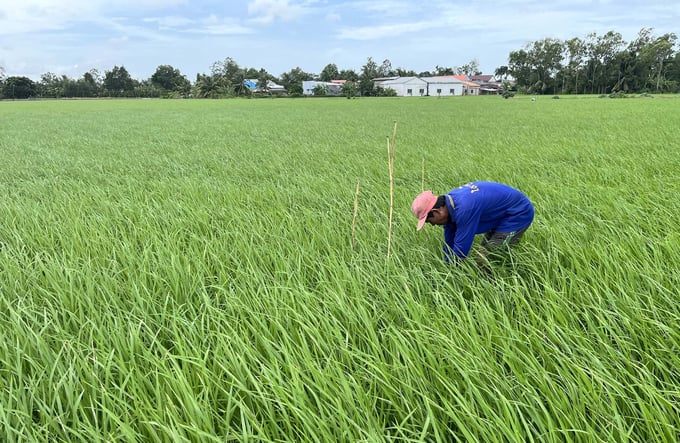May 17, 2025 | 03:41 GMT +7
May 17, 2025 | 03:41 GMT +7
Hotline: 0913.378.918
May 17, 2025 | 03:41 GMT +7
Hotline: 0913.378.918

The 1 million ha of high-quality rice project will be implemented beginning in 2024 on the first 200,000 ha based on the area of the previous VnSAT project. Photo: Thanh Son.
On October 2, MARD in collaboration with some organizations and businesses held Workshop on the role of public-private partnership in the implementation of "one million hectares of high-quality rice connected with green growth in the Mekong River Delta" (or 1 million ha of high-quality rice project for short) in Ho Chi Minh City.
Mr. Le Thanh Tung, Deputy Director of the Department of Crop Production, stated at the workshop that the 1 million ha of high-quality rice project will be implemented beginning in 2024 on the first 200,000 ha based on the area of the previous VnSAT project.
Beginning with the winter-autumn crop of 2023-2024, the scheme would be implemented on 180,000 hectares. By 2/25, the area will increase from 300,000 to 500,000 hectares. The Mekong River Delta will attain one million hectares of high-quality rice connected to green growth by 2030 if an additional 100,000 hectares are added annually between 2026 and 2030.
One of the primary objectives of the one million hectares of high-quality rice initiative is to ensure that the profit margin for producers exceeds 40 percent by 2025 and 50 percent by 2030. This objective is deemed achievable for sustainable rice production.
Mr. Nguyen Van Minh, Technical Director of Syngenta Vietnam, explained that the GroMore TM solution integrates cultivation measures in accordance with each growth stage of the paddy plant in order to ensure a significant increase in yield, quality, and income for farmers under increasing biotic and abiotic pressure. This solution increases yield by an average of 6% per hectare and profits by an average of 40% per hectare. In particular, the rice produced leaves no pesticide residues and is exportable to the U.S. and European markets.

Deputy Minister Tran Thanh Nam spoke at the Conference. Photo: Thanh Son.
Mr. Truong Cong Cu, the General Director of Vietnam Fumigation Joint Stock Company (VFC), disclosed that in recent years, VFC has collaborated with the Mekong Delta Rice Institute to construct advanced rice production models, thereby assisting Farmers in increasing their income by 25%.
According to Deputy Minister of Agriculture and Rural Development Tran Thanh Nam, selling carbon credits from emitting rice production is the primary solution for ensuring farmers' profits of over 40% by 2025 and over 50% by 2030. The World Bank has committed to purchasing carbon credits at a rate of 10 USD per ton, and 1 hectare of rice can be sold for approximately 10 tons of carbon, or $100. As a result, developing a Vietnamese rice brand to reduce emissions will generate substantial profits for rice farmers. In addition, it is intended to promote the exploitation and utilization of rice byproducts and wastes in order to increase the value and economic efficiency of rice production.
Public-private partnership (PPP) plays a vital role in the successful implementation of the "1 million hectares of high-quality rice" initiative. Therefore, at the Conference, experts and businesses discussed the development drivers and potential of public-private cooperation in the rice industry, as well as rice industry development experiences and innovations. Sustainable rice production strategies are anticipated to be presented...
Mr. Nguyen Ngoc Son, a representative of the German International Cooperation Organization GIZ, stated that since 2011, GIZ has collaborated with the Ministry of Agriculture and Rural Development to promote sustainable rice production in Vietnam through Asian Rice Initiative projects on phases 1 and 2, Green Innovation Center (GIC) projects in the Mekong Delta provinces, and one province in the North. 177 contracts help strengthen the capacity of public-private rice chain partners, train trainers on SRP-authorized sustainable rice standards, and educate over 33,000 producers on SRP sustainable rice standards. Training is provided to cooperatives on SRP sustainable rice standards. 22 cooperatives have attained SRP level 2 accreditation, and one cooperative has attained SRP level 3 certification.
In 2024, the GIZ will continue to work closely with the Ministry of Agriculture and Rural Development and the Department of Economic Cooperation and Rural Development to promote sustainable rice production as part of the Green Innovation Center (GIC) project.

Rice production in the Mekong Delta. Photo: Thanh Son.
Ms. Misha Rabat, Grow Asia's Value Chain Program Manager, stated that the organization intends to assist the Rice Industry PPP Working Group in contributing to the implementation of the 1 million ha of high-quality rice project. We will continue to connect public and private sector partners and mobilize resources from the GrowVenture and GrowHer Funds to support food system innovation and strengthen the role of women in the value chain, thereby enhancing the rice industry's adaptation to climate change and increasing incomes for Vietnamese rice farmers.
Many Vietnamese enterprises also expressed special interest in the 1 million hectares of high-quality rice project and are willing to participate in this project. According to Mr. Tran Truong Tan Tai, General Director of Vinarice (Truong Xuan Industrial Cluster, Truong Xuan Commune, Thap Muoi District, Dong Thap Province), the company annually cooperates in seed production on an area of ten thousand hectares and contracts to purchase twenty-five thousand hectares of finished rice. The rice of Vinarice is exported to demanding markets including Europe, Canada, the United States, Japan, and Korea... Vinarice has set a goal to have rice products with reduced emissions by the end of 2024 or the beginning of 2025, and has already implemented a number of technical solutions to help reduce emissions during production.
Translated by Linh Linh

(VAN) Cold-barn systems efficiently manage environmental and temperature conditions, which aids in the prevention of respiratory diseases in pigs and protects them from the vectors that transmit African swine fevers.

(VAN) To tackle challenges, the project 'Addressing key technical bottlenecks in the grouper supply chain in Vietnam' has been underway since 2024.

(VAN) The project 'Disease-Resilient and Sustainable Cassava Production Systems in the Mekong Region', funded by the Australian Center for International Agricultural Research (ACIAR), is being implemented from 2024 to 2028.

(VAN) Data from 10,000 farming households will help professionalize production organization and support the implementation of the One Million Hectares Program for High-Quality, Low-Emission Rice Cultivation.

(VAN) FAO Director-General QU Dongyu marks International Day of Plant Health at NENA conference.

(VAN) Deputy Minister of Agriculture and Environment Hoang Trung affirmed that floriculture and ornamental plants are a growing industry that receives significant global attention.

(VAN) The three staple crops dominating modern diets – corn, rice and wheat – are familiar to Americans. However, fourth place is held by a dark horse: cassava.